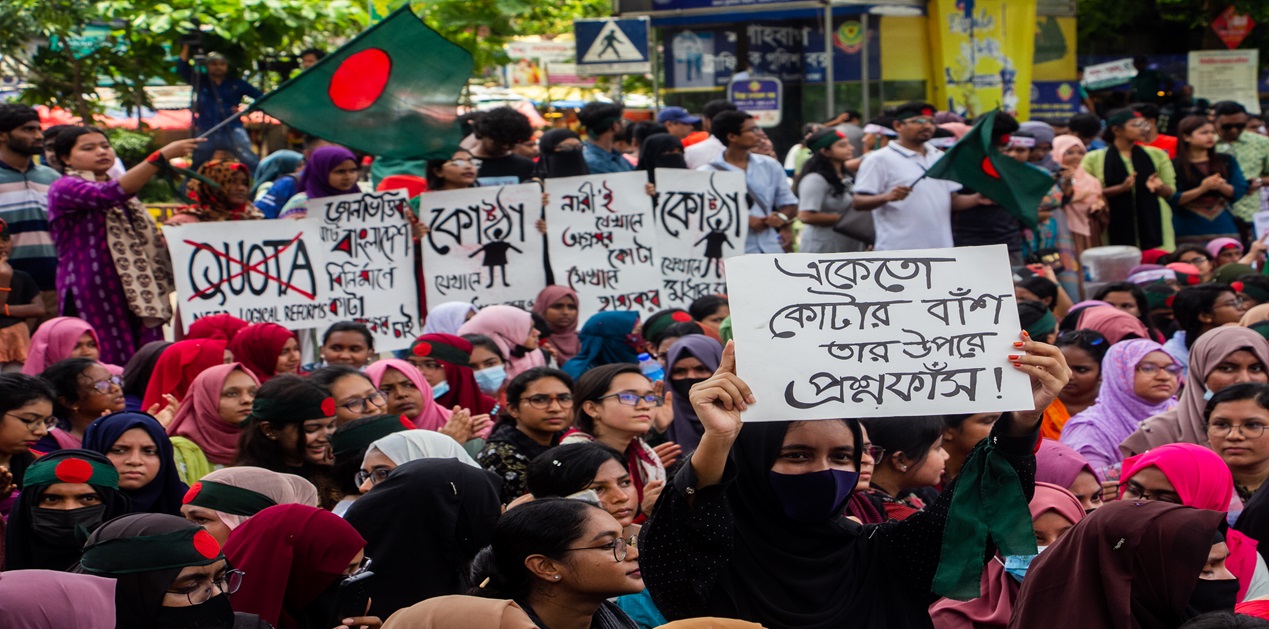Introduction
The 2024 Bangladesh quota reform movement has become one of the most significant socio-political upheavals in the country’s recent history. Initially sparked by the reinstatement of a controversial quota system for government jobs, the movement has evolved into a broader struggle against perceived authoritarianism and corruption. This blog aims to provide an in-depth look at the movement, recent events, and the current situation in Bangladesh.
Background
The quota system in Bangladesh, which reserves a significant portion of government jobs for descendants of freedom fighters, has long been a contentious issue. Initially implemented to honor those who fought in the 1971 Liberation War, the system has faced criticism for perpetuating inequality and limiting opportunities based on merit. The 2018 quota reform movement led to a reduction in these quotas, but a recent Supreme Court ruling reinstated them, sparking widespread protests once again.
Timeline of Recent Events
Early Phase (June – July 2024)
- June 6, 2024: Protests begin in response to the Supreme Court ruling reinstating the quota system.
- July 15, 2024: Violent clashes erupt at Dhaka University, resulting in over 300 injuries.
- July 21, 2024: The Supreme Court orders a revised quota system, reducing the quota for freedom fighters’ descendants to 5% and reserving 93% of government jobs for merit-based recruitment.
Escalation (Late July 2024)
- July 26, 2024: Prime Minister Sheikh Hasina visits Dhaka Medical College Hospital amidst ongoing protests. The government announces a nationwide curfew.
- July 29, 2024: The government reports a death toll of 147 from the protests. Social media remains shut down.
- July 31, 2024: Students and teachers hold silent processions and rallies. Eminent citizens form a probe body to investigate the violence.
Recent Developments (August 2024)
- August 1, 2024: The government bans Jamaat-Shibir under the anti-terrorism act. Six protest organizers are released from custody.
- August 2, 2024: Two more protesters are killed in clashes with police and ruling party activists. A countrywide demonstration is announced for the next day.
- August 5, 2024: Nearly 100 people are killed in violent confrontations as students call for a march to Dhaka, demanding Prime Minister Hasina’s resignation.
Current Situation
As of today, the situation in Bangladesh remains tense. The government has imposed an indefinite nationwide curfew, and internet access is severely restricted. The garment industry, a critical sector for the country’s economy, has been shut down, and public transportation services are halted. Despite these measures, student organizations continue to mobilize, calling for mass protests and the resignation of Prime Minister Hasina.
Casualties
The protests have resulted in significant casualties. According to recent reports, over 300 people have been killed since the movement began, including nearly 100 fatalities in a single day of clashes on August 4, 2024. The violence has also led to thousands of injuries, with both protesters and law enforcement officers among the victims.
Conclusion
The 2024 Bangladesh quota reform movement has highlighted deep-seated issues within the country’s political and social systems. While the immediate trigger was the reinstatement of the quota system, the protests have evolved into a broader call for democratic reforms and accountability. As the situation continues to unfold, the international community watches closely, urging the Bangladeshi government to address the protesters’ demands and ensure the protection of human rights.









